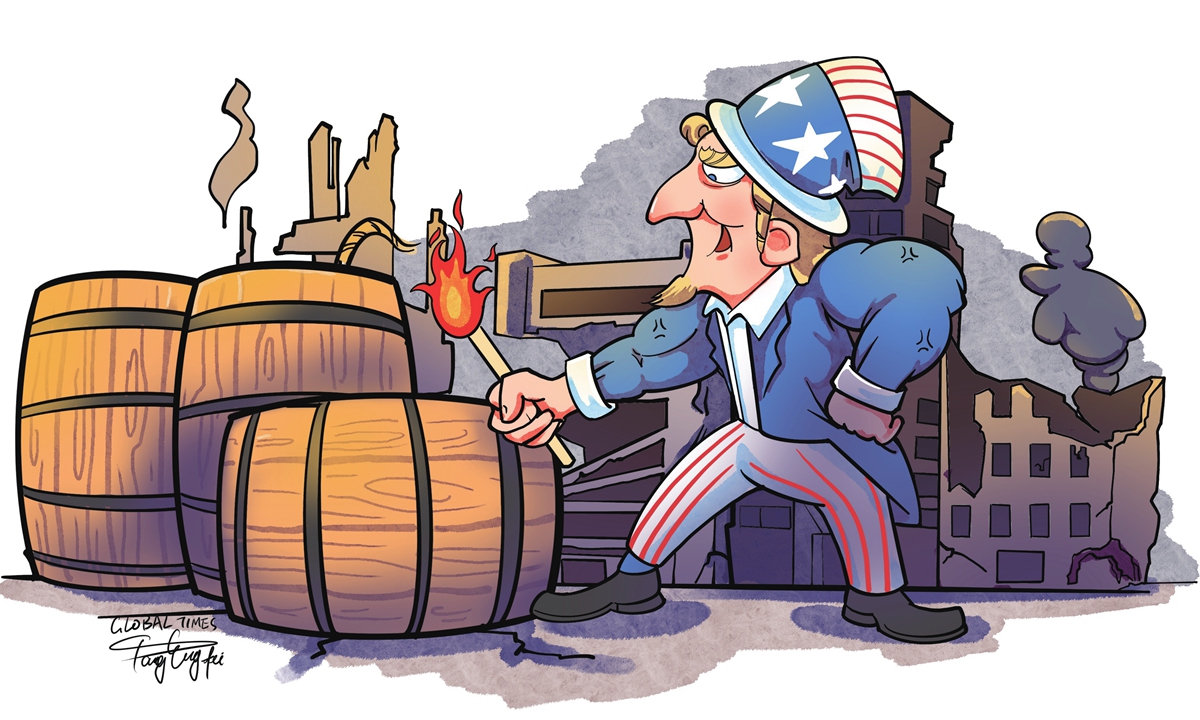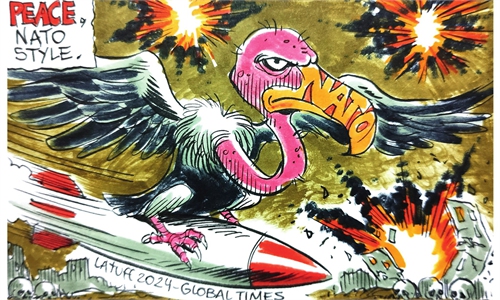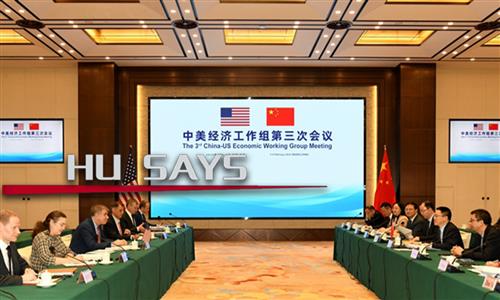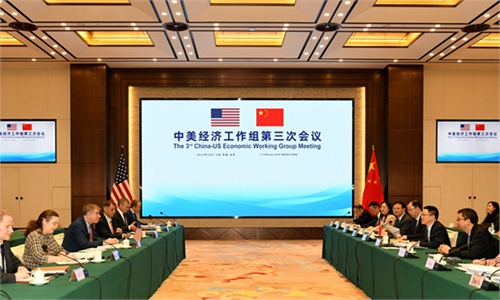
Illustration: Tang Tengfei/GT
The US has struggled with a congenital defect - its addiction to wars. President John Quincy Adams famously said, "America does not go abroad in search of monsters to destroy." However, history tells a very different story, with the US having spent about 94 percent of the time in wars since 1776. The American Empire now has 800 military bases in 140 countries, and keeps doubling down on perpetual wars. Not satisfied with the current proxy and real wars in Ukraine, Gaza, Yemen, Lebanon, Iraq, Syria - and possibly Iran soon - the cackle of American think tanks and corporate media is clamoring for a delusional hot war against China.
The narrative against China can only be described as psychological projection. Using twisted logic and fallacies, the China hawks scream that China is a threat to the US and the world. But they forget to mention that the US has been waging non-stop economic war and propaganda war against China for years. Also, it is the US that surrounds China with hostile military bases - building new ones in the Philippines. Yet, in the world of inversion, China is the bad guy.
The US tries to hobble China's economy in countless ways, and then claims that China's slower GDP growth - relative to China's past performance, but still much better than the G7 nations - is an indication of China's intent to "invade Taiwan."
From Monday through Wednesday, US media gloats that China is collapsing. And Thursday through Sunday, the same media cries that China is on the cusp of taking over the world. Which one is it - China is weak or omnipotent?
Another popular talking point among anti-China hardliners is the rapid growth in China's defense investment. China's military strategy is mostly defensive like the Great Wall. China is a "threat" only to rapacious invaders.
As for Taiwan, here is the bitter pill for imperialists: there will be reunification. When China was weak in the 19th century, it was attacked by vultures who plucked off strategic regions. However, as China regained its rightful position in the world, former colonialists retreated, giving back the stolen lands. Remember how Portugal returned Macau and the UK returned Hong Kong? Similarly, the US will one day let go of Taiwan. The sooner the Americans accept this inevitability, the better the world will be.
There was a time when one could tell the difference between a sensational tabloid and serious journalism in the US, but not anymore. Now, the once respectable media outlets such as the New York Times and Wall Street Journal are filled with fake news, disinformation and war propaganda.
A recent article by Hal Brands in Foreign Policy is an exemplary case for this decline in American intellectualism. By the way, Mr. Brands has stellar credentials - educated at Stanford and Yale, author of numerous books, and a regular columnist. However, his article is filled with misinformation and sensationalism. Lacking any real evidence of "China threat," he quotes the CIA, the organization that lies, cheats and steals - to paraphrase Mike Pompeo, former CIA director.
Finally, Hal Brands' entire premise about the state of China's economy is deeply flawed. In his echo chamber, nobody talks about China's 5.2-percent GDP growth in 2023, a trade surplus of a staggering $800 billion, China becoming the world's #1 exporter of cars, BYD surpassing Tesla, the resurgence of Huawei, and a long list of other accomplishments.
China watchers have been wrong for long but nobody gets fired for being wrong about China. Why? The goals of incessant big lies are to convince Americans that they have the greatest economic and political systems, and to manufacture consent for a war against China. Sadly, the propagandists are quite successful - the number of Americans who view China favorably dropped from 53 percent in 2018 to 15 percent by 2023 (Gallup Poll).
This is not the old Cold War. Today, the US economy is intricately linked to and dependent on China. From Apple and Tesla to Walmart and Starbucks, American corporations' fortunes depend on Chinese workers and consumers. Even the US military cannot function without Chinese products - for example, the CEO of Raytheon admitted that his company relies on "thousands of Chinese suppliers." Decoupling is a pipe dream.
US elites need a grand reset in their understanding of the world. A multipolar world is emerging. The US needs to stop being the "most warlike nation in history of the world," as Jimmy Carter put it. It's time to discard the paradigms of the military-industrial complex, and instead embrace a future of multilateralism, development and peace.
The author is a geopolitical analyst, columnist, blogger, podcaster, and writer based out of Bangalore, India. His work can be found on Substack, X and more. opinion@globaltimes.com.cn



